Share
Working at ESO
Are you interested in working in areas of frontline technology and in a stimulating international environment? Do you feel your profile matches our requirements? Learn more about our current vacancies and apply online. Read more..
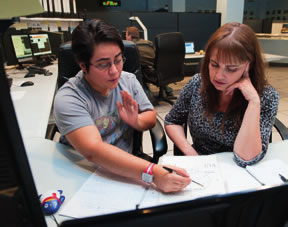
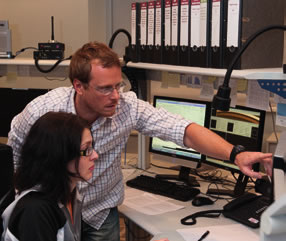

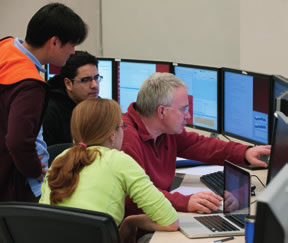
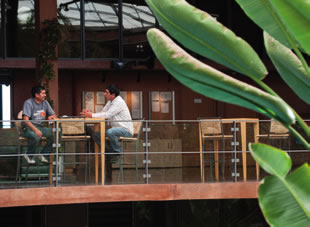
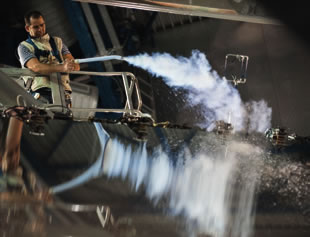
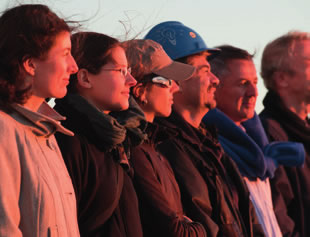
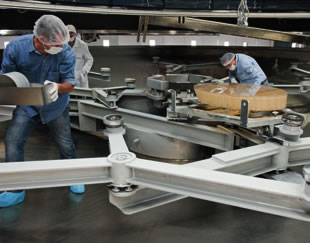
The European Organisation for Astronomical Research in the Southern Hemisphere (ESO) is the foremost intergovernmental astronomy organisation in Europe and the world's most productive ground-based astronomical observatory. ESO carries out an ambitious programme focused on the design, construction and operation of powerful ground-based observing facilities enabling astronomers to make important scientific discoveries.
ESO operates three unique world-class observing sites in northern Chile: La Silla, Paranal and Chajnantor (home to ALMA and APEX), and the ESO Headquarters are located in Garching, near Munich, Germany.
At Paranal, ESO operates the Very Large Telescope, the world's most advanced visible-light astronomical observatory. ESO is a major partner in ALMA, the largest astronomical project in existence. And on Cerro Armazones, ESO is building the 39-metre European Extremely Large Telescope, which will become "the world's biggest eye on the sky" and whose operations will be fully integrated into the Paranal Observatory.
Due to the need for additional resources associated with the ELT programme, for its Electronic Engineering Department (ELE), within the Directorate of Engineering (DoE) at its Headquarters in Garching, near Munich, ESO is advertising the position of
Electronics/Detector Systems Engineer
Garching
Deadline 01/10/2021
We are looking for an engineer/physicist to join the Electronic Detector Systems Group (EDES) to cover a wide range of roles, working in all aspects of designing and delivering new detector systems and their electronics to our observatories and partner organisations. The department comprises a group of 32 electronic engineers, physicists and technicians who are responsible for the definition, design and implementation of complex control systems for advanced optical and infrared astronomical instrumentation, detectors and telescope systems required for ESO's Observatories in Chile.
As an Electronics/Detector Systems Engineer, with an electronics engineering/physics background you will be involved in the detailed design of the electronics required to operate the latest generation of astronomical detectors. Depending on your experience of electronics, this might include low noise analogue electronics circuit design to be used cryogenically, and/or in the detailed design and development of the next generation of detector control systems which might include the VHDL developments, using the very latest FPGA technology with 10 Gbit link technology, or even the development of ASICs etc.
You may also be involved in defining the appropriate sensor technology and detector controller systems to fulfil the astronomical scientific requirements of infrared and visible instruments and to design, modify, integrate and qualify these detector systems using proven calibration and test techniques. You may also have responsibility for the final performance of the delivered detector systems and be able to provide support to the observatory staff for long term maintenance and problem-solving
Main Duties and Responsibilities:
The successful candidate will work on a subset of the below mentioned fields:
- Design, build and integrate complex astronomical detector systems, including the required electronics and hardware
- Detailed design of new electronics for next generation detector controllers which might including high voltage clock circuitry, low noise electronics, high speed electronics, low noise bias generation circuitry and complex VHDL design
- Integrate, qualify and test IR/visible imaging systems using calibration techniques
- Define and flow down requirements for future astronomical detectors and detector systems, working in collaboration with detector manufacturers and the scientific community
- Conduct technical assessments of instrument requirements and analyse detector system performance
- Provide technical direction to interdisciplinary teams to support the development of detector imaging systems
- Collaborate with ESO Engineers from other projects and Observatories, to define common approaches and standards and share experiences
- Provide support to observatory staff for maintenance and problem solving on optical/IR detectors systems already in operation
Duties and responsibilities are not limited to the above, and a flexible approach and willingness to adapt is required.
Key Competence and Experience:
We are looking for a candidate who is already familiar with the main fields described, that is electronic design and detector systems.
Essential competence:
- Analogue electronic circuit design with experience in design of very low noise electronics (d.c. to 50 MHz)
- High-speed electronic schematic design and its corresponding PCB layout
- Rigid-flexi PCB design
- Aspects of Infrared/Visible, (CCD and/or CMOS) detector system design, integration, qualification and test;
- Provide clear, concise and timely oral and written communications, identifying the key issues, examining options and proposing a way ahead
- Effective and committed team player with ability to look for pragmatic solutions
- Excellent cross-disciplinary communication skills both oral and written
Desirable competence would be:
- Experience with software scripting languages, such as Python
- PSPICE modelling
- VDHL design and implementation with latest generation of FPGAs
- Semiconductor detector physics
- Radiometry and calibration techniques
- Cryogenic/vacuum technology concepts and handling
- Handling of sensitive and expensive opto-electrical components, clean room experience
- Ability to and experience of working efficiently within an international and multi-cultural environment both independently and with diverse stakeholders including ability to build and manage collaborative working relationships with multi-disciplinary stakeholders
- Pro-active approach to contribute ideas for improvement and future developments
For the position you should have at least three years of professional work experience within the area of the aforementioned essential competence.
Qualifications:
University degree (MSc) in preferably electronics or physics with proven electronics experience, or an equivalent educational level.
Language Skills:
A very good command of the English language - oral, reading and writing - is essential and a working knowledge of German or Spanish would be an advantage.
Reports to:
Head of the Detector Group of the Electronic Engineering Department.
Remuneration and Contract:
We offer an attractive remuneration package including a competitive salary (tax free), comprehensive pension scheme and medical, educational and other social benefits, as well as financial help in relocating your family and the possibility to place your child/children in day care.
The contract is for a fixed-term duration of three years and is subject to successful completion of the probation period. There is a possibility of extension(s) subject to individual performance and organisational requirements, and as defined in the applicable policies and staff rules and regulations. For any further information, please visit ESO's conditions of employment (https://www.eso.org/public/jobs/conditions/intstaff/).
Starting Date:
As soon as possible
Duty Station:
ESO Headquarters in Garching, near Munich, Germany.
Career Path: V
Application:
If you are interested in working in areas of frontline science and technology and in a stimulating international environment, please visit http://www.eso.org for further details.
Applicants are invited to apply online at http://jobs.eso.org/. Applications must be completed in English and should include a motivation letter and CV.
Deadline for applications is 1 October 2021.
Interviews are expected to start soon after this date.
No nationality is in principle excluded, however, recruitment preference will be given to nationals of Australia, Austria, Belgium, the Czech Republic, Denmark, Finland, France, Germany, Ireland, Italy, the Netherlands, Poland, Portugal, Spain, Sweden, Switzerland and the United Kingdom irrespective of gender, age, disability, sexual orientation, ethnicity or religion.
